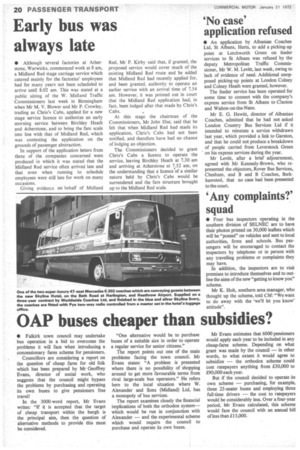OAP buses cheaper than subsidies?
Page 22

If you've noticed an error in this article please click here to report it so we can fix it.
• Falkirk town council may undertake bus operation in a bid to overcome the problems it will face when introducing a concessionary fares scheme for pensioners.
Councillors are considering a report on the question of cheap fares for old folk which has been prepared by Mr Geoffrey Evans, director of social work, who suggests that the council might bypass the problems by purchasing and operating its own buses to give pensioners free travel!
In the 3000-word report, Mr Evans writes: "If it is accepted that the target of cheap transport within the burgh is the principal aim, then the question of alternative methods to provide this must be considered. "One alternative would be to purchase buses of a suitable size in order to operate a regular service for senior citizens."
The report points out one of the main problems facing the town council. Mr Evans states: "A problem is presented where there is no possibility of shopping around to get more favourable terms from rival large-scale bus operators." He refers here to the local situation where W. Alexander and Sons (Midland) Ltd, has a monopoly of bus services.
The report examines closely the financial implications of both the orthodox system— which would be run in conjunction with Alexander — and the experimental scheme which would require the council to purchase and operate its own buses. Mr Evans estimates that 6000 pensioners would apply each year to be included in any cheap-fares scheme. Depending on what grant was made by the council — in other words, to what extent it would agree to subsidize — the orthodox scheme could cost ratepayers anything from £.30,000 to £90,000 each year.
But if the council decided to operate its own scheme — purchasing, for example, three 25-seater buses and employing three full-time drivers — the cost to ratepayers would be considerably less. Over a four-year period, Mr Evans calculated, this scheme would face the council with an annual bill of less than £13,000.










































































































